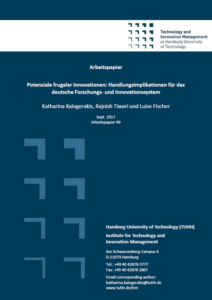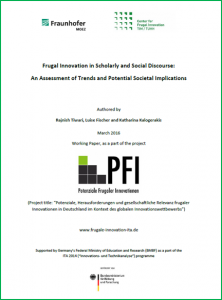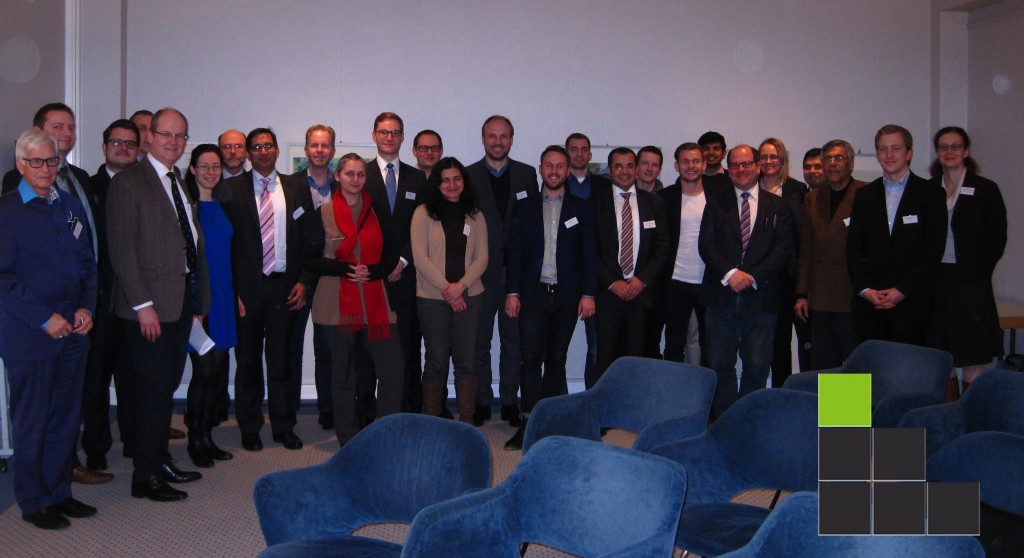 In Deutschland ist ein Trend hin zu mehr Frugalität und folglich zu frugalen Innovationen erkennbar. Dieser Trend wird maßgeblich getrieben von der zunehmenden Bedeutung von Wachstumsmärkten in Schwellenländern, der Einkommensentwicklung in der hiesigen Gesellschaft sowie dem sich wandelnden Werteverständnis – besonders dem hohen Umweltbewusstsein und der Wahl moderater Lebensstile durch viele (insbesondere junge) Leute. Auch die demographische Entwicklung („alternde Gesellschaft“) scheint die Nachfrage nach benutzerfreundlichen, weniger komplexen und zugleich erschwinglichen Lösungen zu steigern. Die vorliegende Studie von Katharina Kalogerakis, Rajnish Tiwari und Luise Fischer setzt sich mit den politischen Handlungsimplikationen dieses Phänomens für das deutsche Forschungs- und Innovationssystem auseinander.
In Deutschland ist ein Trend hin zu mehr Frugalität und folglich zu frugalen Innovationen erkennbar. Dieser Trend wird maßgeblich getrieben von der zunehmenden Bedeutung von Wachstumsmärkten in Schwellenländern, der Einkommensentwicklung in der hiesigen Gesellschaft sowie dem sich wandelnden Werteverständnis – besonders dem hohen Umweltbewusstsein und der Wahl moderater Lebensstile durch viele (insbesondere junge) Leute. Auch die demographische Entwicklung („alternde Gesellschaft“) scheint die Nachfrage nach benutzerfreundlichen, weniger komplexen und zugleich erschwinglichen Lösungen zu steigern. Die vorliegende Studie von Katharina Kalogerakis, Rajnish Tiwari und Luise Fischer setzt sich mit den politischen Handlungsimplikationen dieses Phänomens für das deutsche Forschungs- und Innovationssystem auseinander.
Tag Archives: BMBF-ITA
Invitation to the Concluding Conference in Hamburg: “Potentials of Frugal Innovation”
We are very pleased to invite interested researchers, business persons, representatives of industry associations, policy makers and members of civil society to our conference on “Potentials of Frugal Innovation” in Hamburg, Germany, on 27 September 2017.
 The conference marks the conclusion of our BMBF supported research project entitled “Potentials, challenges and societal relevance of fugal innovations in the context of the global competition for innovation.” Partners of this ITA-project are the Fraunhofer Center for International Management and Knowledge Economy in Leipzig and the Institute for Technology and Innovation Management at the Hamburg University of Technology.
The conference marks the conclusion of our BMBF supported research project entitled “Potentials, challenges and societal relevance of fugal innovations in the context of the global competition for innovation.” Partners of this ITA-project are the Fraunhofer Center for International Management and Knowledge Economy in Leipzig and the Institute for Technology and Innovation Management at the Hamburg University of Technology.
Expert workshop predicts high relevance of frugal innovation for German industry & society
On 12 January 2016, around 30 stakeholders from industry, academia and politics met in Hamburg to analyse and discuss the relevance of frugal innovations for German companies and society-at-large. Frugal innovations are defined as (technological) solutions, focussed on their core functions robustness, user-friendliness and affordability. This phenomenon has, so far, predominantly been observed in emerging markets. The model of frugal innovations could, however, also hold great potentials for industrialized nations, such as Germany, and other international marketplaces. The importance of frugal innovations is, as evidence shows, expected to increase for the domestic market, too.
Experten sehen frugale Innovationen auf dem Vormarsch
Erkenntnisse aus dem ersten gemeinsamen Workshop vom Fraunhofer-Zentrum Leipzig und der TU Hamburg
Am 12. Januar 2016 trafen sich rund 30 Vertreter aus Wirtschaft, Wissenschaft und Politik, um die Relevanz frugaler Innovationen für deutsche Unternehmen zu analysieren und zu diskutieren. Als „frugale Innovationen“ werden auf Kernfunktionen fokussierte, robuste, benutzerfreundliche und bezahlbare (Technologie-)Lösungen bezeichnet. Dieses Phänomen wurde bislang vornehmlich in Schwellenländern beobachtet. Für Industrienationen wie Deutschland könnte das frugale Innovationsmodel jedoch im Rahmen des internationalen Wettbewerbs große Potenziale bergen. Ebenso wird erwartet, dass die Bedeutung frugaler Innovationen im Hinblick auf den Binnenmarkt zunimmt.
“Frugal Innovation in Scholarly and Social Discourse”: New Paper on Trends and Societal Implications
 As a part of our joint BMBF-ITA project with Fraunhofer Center for International Management and Knowledge Economy (MOEZ) in Leipzig we have published a new paper to assess trends and potential societal implications of frugal innovation by analyszing scholarly and social discourse.Apart from this the paper also reports results of our workshop held in Hamburg on January 12, 2016 to assess the potentials of frugal innovation in the specific context of Germany. The publication details are as follows:
As a part of our joint BMBF-ITA project with Fraunhofer Center for International Management and Knowledge Economy (MOEZ) in Leipzig we have published a new paper to assess trends and potential societal implications of frugal innovation by analyszing scholarly and social discourse.Apart from this the paper also reports results of our workshop held in Hamburg on January 12, 2016 to assess the potentials of frugal innovation in the specific context of Germany. The publication details are as follows:
Authored by: Rajnish Tiwari a, Luise Fischer b and Katharina Kalogerakis a
a Center for Frugal Innovation, Institute for Technology and Innovation Management, Hamburg University of Technology (TUHH), Hamburg, Germany
b Fraunhofer Center for International Management and Knowledge Economy (MOEZ), Leipzig, Germany
Abstract
The topic of frugal innovation is increasingly gaining relevance in social as well as scholarly discourse. Frugal innovations have been perceived by many to be a phenomenon generally confined to emerging economies where there are large groups of unserved consumers with unmet needs. But there is increasing evidence that this phenomenon is getting relevant also in the industrialized nations potentially affecting the long-term competitiveness of domestic firms not only overseas but also at home.

